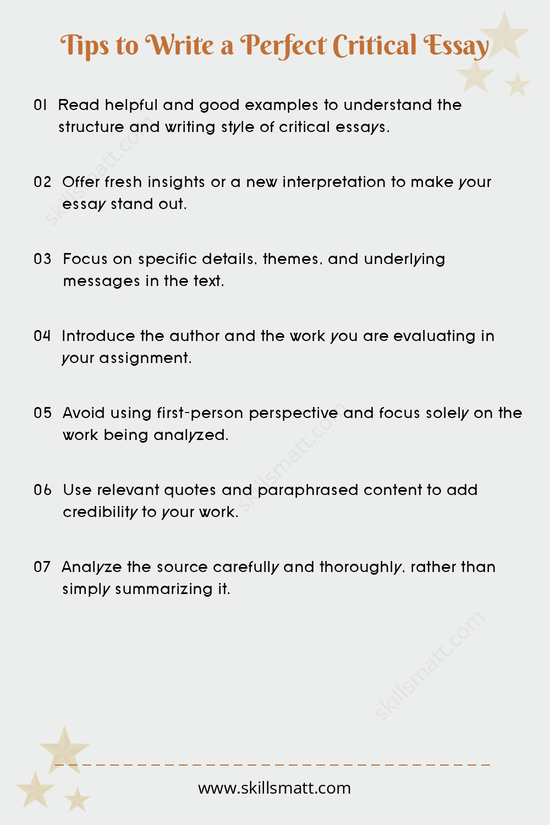Tips to Write a Perfect Critical Essay
- Read helpful and good examples to understand the structure and writing style of critical essays: Analyze various critical essay examples to familiarize yourself with their format and tone. This will help you develop a clear and concise writing style while staying within the structure of a critical essay.
- Offer fresh insights or a new interpretation to make your essay stand out: A great critical essay offers original perspectives. Go beyond the obvious analysis and present new interpretations or unique insights into the work you are evaluating.
- Focus on specific details, themes, and underlying messages in the text: Instead of summarizing the work, delve deeper into its themes, motifs, and underlying messages. Pay attention to smaller details that can have a large impact on your analysis.
- Introduce the author and the work you are evaluating in your assignment: Provide sufficient context for your readers. Include details about the author, the work being evaluated, and any relevant historical or cultural background.
- Avoid using first-person perspective and focus solely on the work being analyzed: A critical essay should maintain an academic tone. Avoid using first-person pronouns like "I" or "we." Focus on the text and its elements rather than your personal feelings.
- Use relevant quotes and paraphrased content to add credibility to your work: Strengthen your arguments by quoting directly from the work or using paraphrased content. This shows that your analysis is rooted in evidence and provides support for your thesis.
- Analyze the source carefully and thoroughly, rather than simply summarizing it: A critical essay is about analysis, not summarization. Go deeper into the text, examining how different elements contribute to the overall work. Consider the author's intent, use of literary devices, and the impact of the work's themes.
- Maintain a clear structure to guide your reader: Organize your critical essay into well-defined sections—introduction, body, and conclusion. In the introduction, briefly outline the work you’re analyzing. In the body paragraphs, present your analysis and arguments. Conclude by summarizing the key insights and restating your evaluation.
- Be objective and avoid bias: While it's important to present your perspective, always maintain an objective tone. Avoid personal bias, and focus on analyzing the work based on evidence rather than personal preferences or emotions.
- Proofread and revise your essay before submission: After completing your essay, take time to proofread it for clarity, grammar, and structure. Revising your essay ensures that your arguments are presented clearly and without errors, strengthening the overall quality of your critical analysis.

